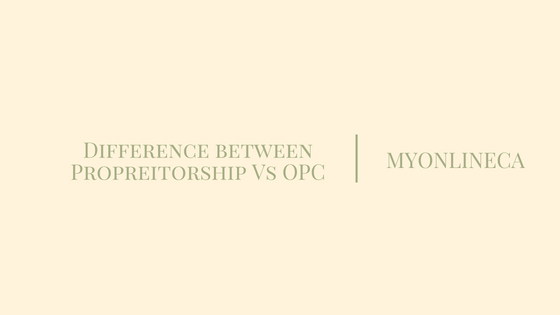In This Article, We will Inform You about what is The key difference Between a Proprietorship Firm Or sole Proprietorship firm And One person company That will enable you to clearly understand What is proprietorship and One Person company.
What Is a Proprietorship or Sole Proprietorship?
The easiest type of business carried on by people who are by and by subject for debt. A sole proprietorship is certainly not a legal entity like a partnership or a corporation. A sole-proprietor can begin a business under his name or under an invented name. Expenses are ostensibly to begin this sort of business, be that as it may, the drawback lies with monetary disappointment circumstance. On the off chance that the business neglects to win a benefit then loan bosses can record a claim against sole-proprietor. Business risk can be released against his own advantages. Also, if the proprietor kicks the bucket, there are little odds of survival. Extension of business after a point turns into an intense activity. The preferred standpoint is this sort of business people require not go into executive gatherings and yearly gatherings. Returns are marked under their name. They have adaptable working hours.
What is One person Company?
The Companies Act, 2013 presented another type of business, a half and half of Sole-proprietorship and Company, by giving sole proprietors a chance to go into a corporate world. It is dealt with as a privately owned business just having a separate legal entity and limited liability. One Person Company as an organization is characterized according to Companies act 2013 under Section 2,62 OPC which has just a single individual as a part.
What Is The Difference between Proprietorship and One Person Company
- A sole proprietorship experiences “unlimited Liability” which implies that if the business brings about misfortunes the benefits of the organization, as well as the proprietor, might be utilized to pay off this obligation. An OPC, then again, is a different legitimate substance and henceforth the proprietor has a restricted obligation in the event that the business endures a misfortune.
- An OPC, by the goodness of being enrolled as a Private Limited Company, might be liable to charges as needs are. There is no different assessment section for an OPC and it should be exhausted in accordance with the arrangements of the Income Tax Act for the Pvt. Ltd. Organization. Tax assessment process is distinctive for a sole proprietorship as the pay of the organization is dealt with as the salary of the person who is the proprietor and he is exhausted appropriately.
- For the motivations behind progression, an OPC needs a chosen one assigned by its part. The chosen one ought to likewise be a characteristic conceived native and inhabitant of India. The candidate should, in case of the passing of the part, turn into an individual from the organization and might be in charge of the running of the organization. On account of a sole proprietorship, be that as it may, progression can just happen through an execution of the Last Testament and Will, which might possibly be tested in a courtroom.
- A One Person Company needs to record Annual Returns and meet different compliances of a Private Limited Company and would likewise need to get its records inspected in a similar way. Then again, a sole proprietorship will just need to get its records reviewed under the arrangements of Section 44 AB of the Income Tax Act, i.e., if its turnover crosses the predetermined edge.
- A One Person Company must change over itself into a private or public limited company the minute it has a normal turnover of over Rs. 2 crores for a long time or a paid-up share capital of over Rs. 50 lakh. A sole proprietorship, then again, may stay one regardless of what its incomes are.
Conclusion
I hope you like this article about Difference between Proprietorship Vs OPC. still, if you are confused you can check out our website to know more and Register a One Person Company or Sole proprietorship in India
